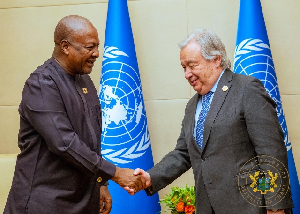MOHAMMED Ibn Chambas, Executive Secretary of the Economic Community of West African States, is confident that the bilateral discussions between Ghana and Nigeria on the latter?s outlaw of some Ghanaian products from its market would ease the tension between the two countries.
The sub-regional Chief Scribe said the regional body is concerned about the situation and is urging these discussions between the two countries with the aim of working out an amicable solution.
In 2004, Nigeria placed a ban on the importation of over ninety-six Ghanaian products including textiles, garments, starch, plastics, poultry products and rice, among others. The ban came despite the existence of a 1999 ECOWAS treaty on trade liberalisation to which Nigeria is a signatory. Under this ECOWAS trade treaty, which is a revised version of an earlier ECOWAS treaty, member countries are free to export and import items into each other?s country without quotas or any other form of restriction.
In an exclusive interview with The Statesman, Dr. Chambas was asked to describe what, if any, plans ECOWAS had to enforce its trade treaty if no conclusive agreement could be reached between the two countries. ?Let?s just wait,? he said, ?for the outcome of the technical committee meeting.? Such a noncommittal response could lead one to wonder if the regional body even has an institutionalised method of enforcing its treaty.
However, Ken Ukaoha, President-General of the National Association of Nigerian Traders has recently remarked publicly that the ban was merely an interim measure while ECOWAS took steps to harmonise its trade relations.
According to Ukaoha, his country was forced to place the ban as a result of the on-going trade negotiations on the Economic Partnership Agreements (EPAs) of the World Trade Organisation (WTO). The EPAs allow signatories to only open up their markets for members of the partnership, a stipulation which Ukaoha called unfair. ?Nobody feels happy over the issue,? he said. ?But the current push by Europe and the West on the EPA means we need to sit back and rethink on how to harmonise our trade rules so that we will not be caught on the wrong footing in our dealings with our partners.?
Business News of Friday, 2 September 2005
Source: Statesman












